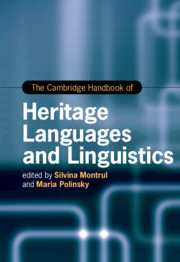Book contents
- The Cambridge Handbook of Heritage Languages and Linguistics
- Cambridge Handbooks In Language And Linguistics
- The Cambridge Handbook of Heritage Languages and Linguistics
- Copyright page
- Dedication
- Contents
- Figures and Tables
- Contributors
- Acknowledgments
- Introduction
- Part I Heritage Languages around the World
- Part II Research Approaches to Heritage Languages
- 15 Heritage Language Research and Theoretical Linguistics
- 16 The Emergence of Heritage Language
- 17 Sociolinguistic Approaches to Heritage Languages
- 18 The Psycholinguistics of Heritage Languages
- 19 Contact Linguistics and Heritage Languages
- 20 A Narrative-Ethnographic Approach to Research on Heritage Language Development
- 21 Corpus-Based Methodologies in the Study of Heritage Languages
- 22 Current Trends and Emerging Methodologies in Charting Heritage Language Grammars
- Part III Grammatical Aspects of Heritage Languages
- Part IV Heritage Language Education
- Index
- References
18 - The Psycholinguistics of Heritage Languages
from Part II - Research Approaches to Heritage Languages
Published online by Cambridge University Press: 04 November 2021
- The Cambridge Handbook of Heritage Languages and Linguistics
- Cambridge Handbooks In Language And Linguistics
- The Cambridge Handbook of Heritage Languages and Linguistics
- Copyright page
- Dedication
- Contents
- Figures and Tables
- Contributors
- Acknowledgments
- Introduction
- Part I Heritage Languages around the World
- Part II Research Approaches to Heritage Languages
- 15 Heritage Language Research and Theoretical Linguistics
- 16 The Emergence of Heritage Language
- 17 Sociolinguistic Approaches to Heritage Languages
- 18 The Psycholinguistics of Heritage Languages
- 19 Contact Linguistics and Heritage Languages
- 20 A Narrative-Ethnographic Approach to Research on Heritage Language Development
- 21 Corpus-Based Methodologies in the Study of Heritage Languages
- 22 Current Trends and Emerging Methodologies in Charting Heritage Language Grammars
- Part III Grammatical Aspects of Heritage Languages
- Part IV Heritage Language Education
- Index
- References
Summary
There is a natural affinity between psycholinguistics and research on heritage language acquisition. First, language acquisition is a core area of study in psycholinguistics (along with language processing and language disorders). Second, psycholinguistics often employs technologically advanced methods such as eye-tracking for empirical language research; such methods are also receiving increasing attention in research on heritage speakers because underdeveloped literacy means that some more traditional empirical tests can put them at a disadvantage relative to prototypical native speakers and second language learners. This chapter provides a review of psycholinguistic research on adult heritage speakers, including speech perception and production, lexical and morphological processing, sentence processing, and processing at levels beyond the sentence, using both offline and online (i.e., real-time) methods. Some overarching issues that are relevant to much of the research in this chapter include cross-linguistic influence between the two languages of a heritage bilingual and the role of language background variables like age of acquisition, early exposure, and proficiency level. To our knowledge, this is the first review of psycholinguistic work with heritage speakers that includes all languages.
Keywords
- Type
- Chapter
- Information
- The Cambridge Handbook of Heritage Languages and Linguistics , pp. 449 - 470Publisher: Cambridge University PressPrint publication year: 2021
References
- 4
- Cited by

